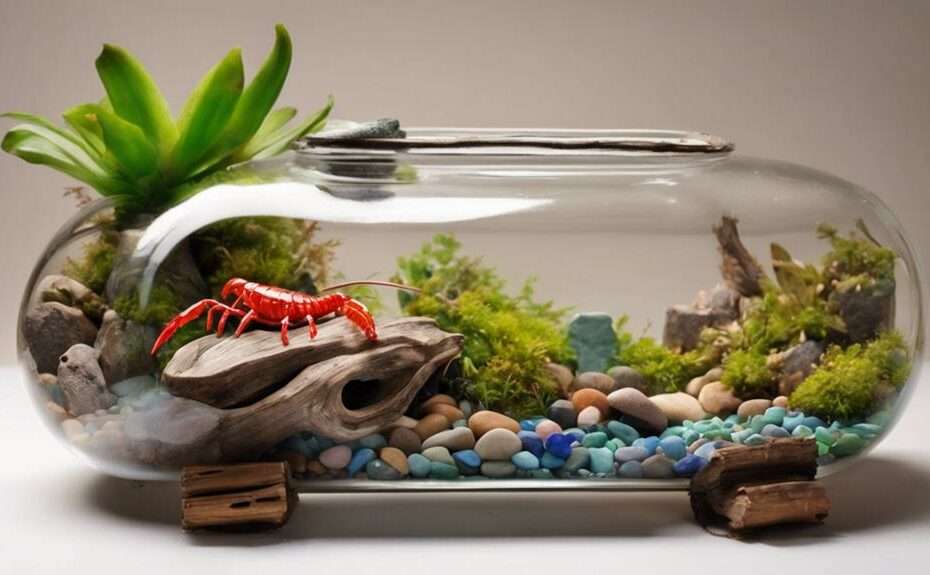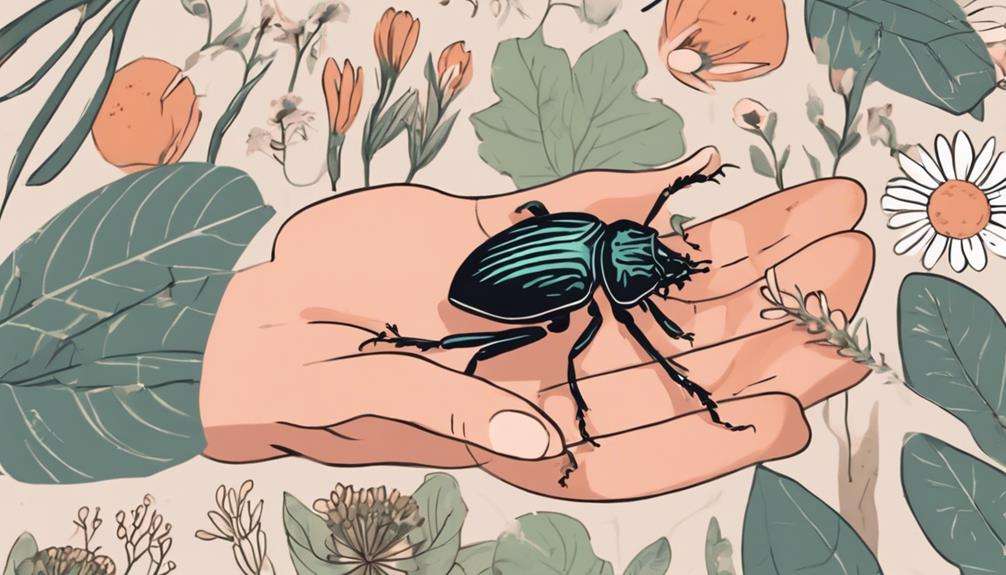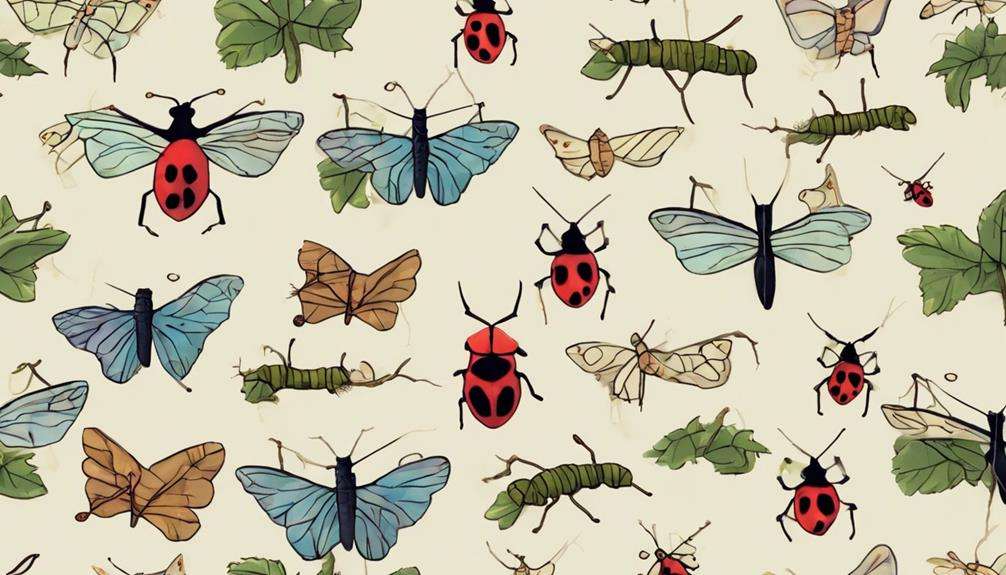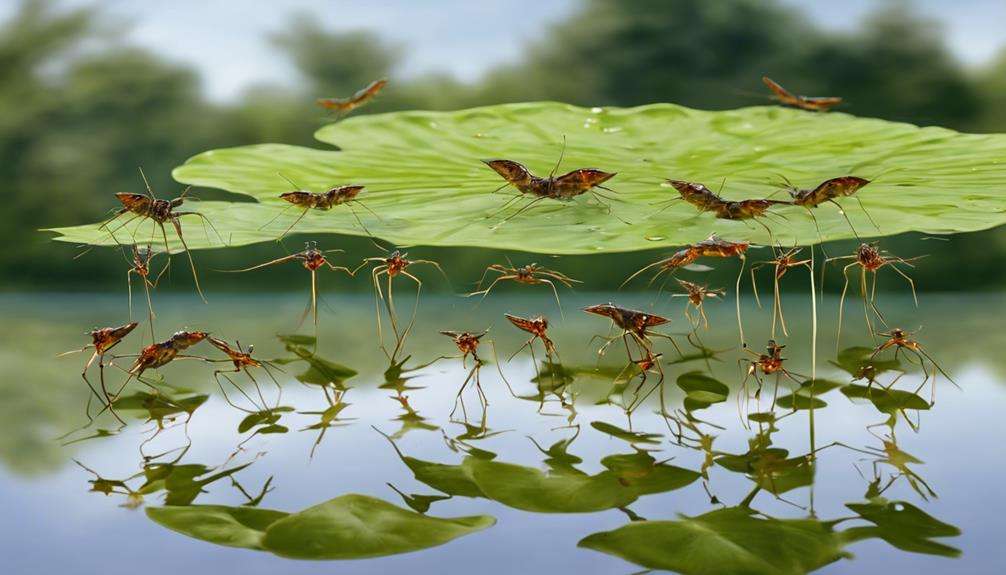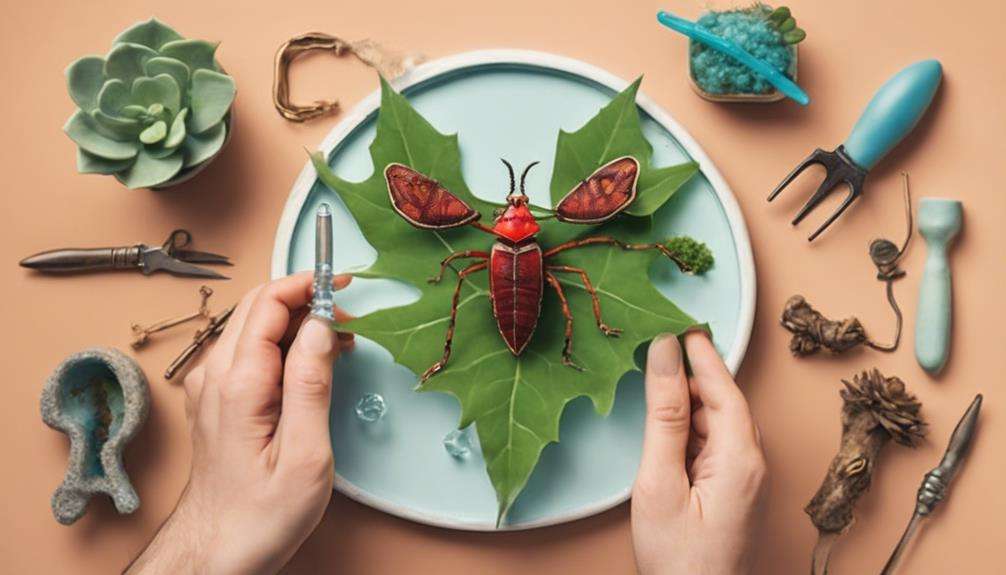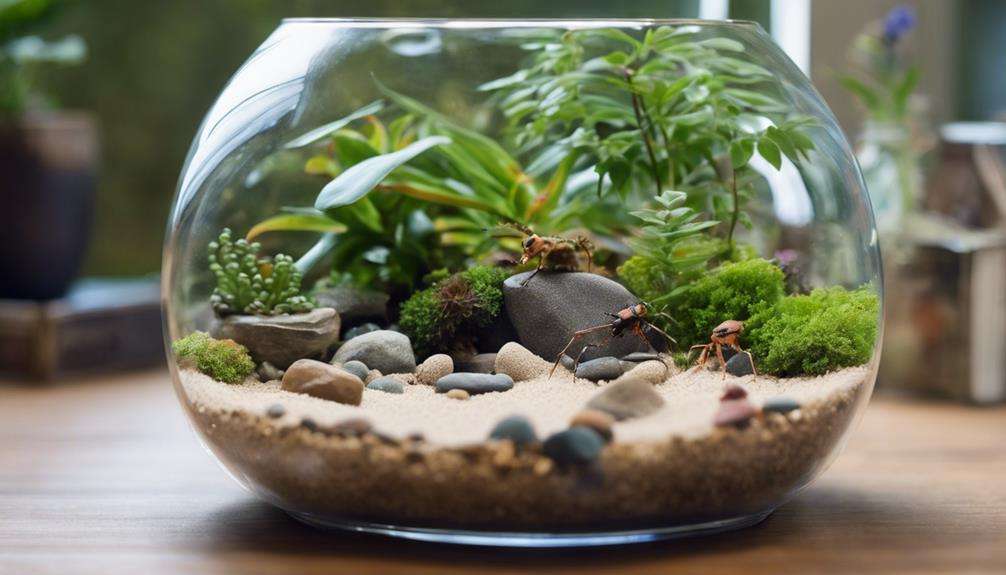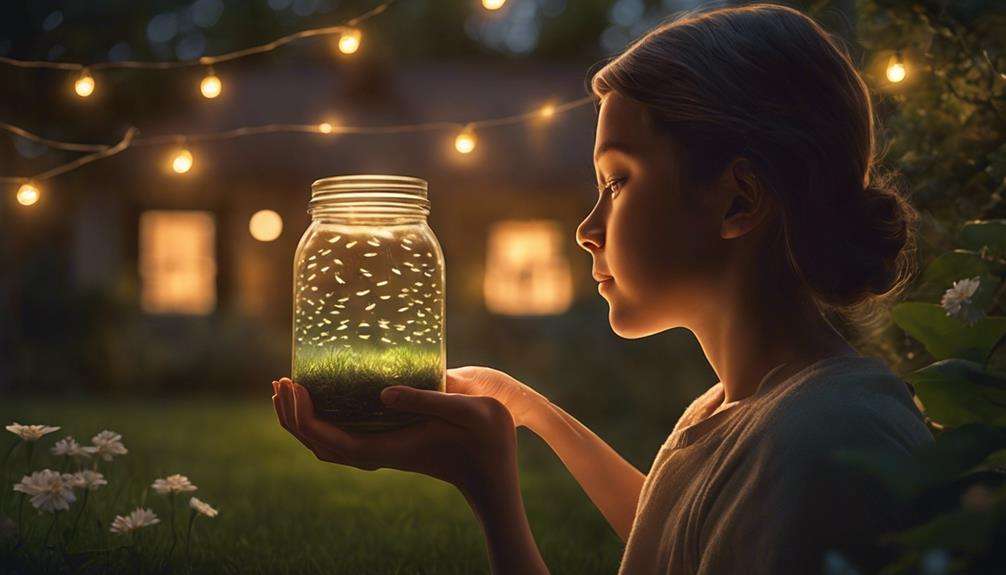Imagine stepping into the world of pet scorpions, where caring for these intriguing creatures is akin to maintaining a delicate ecosystem in a miniature desert landscape.
As you navigate through the chapters of this guide, you'll unravel the secrets to creating a safe haven for your scorpion companion, from designing a cozy burrow to mastering the art of temperature regulation.
But what if I told you there's more to discover beyond just the basics? Stay tuned to uncover the nuances of scorpion care and expose the hidden gems of this enchanting pet-owning journey.
Key Takeaways
- Choose a 5-10 gallon enclosure with proper humidity and temperature levels
- Feed scorpions live insects and supplement their diet based on size and health
- Handle scorpions safely with long tweezers, gloves, and protective gear
- Provide essential care, nutrients, and engage with enthusiasts for advice and knowledge
Setting Up the Scorpion Enclosure
To create a suitable habitat for your pet scorpion, choose an enclosure size of at least 5-10 gallons to guarantee ample space for their needs. When considering the humidity of the habitat, it's essential to maintain levels between 60-70%.
Achieving this can be done by misting one side of the enclosure daily, allowing for a gradient in humidity levels. The substrate plays a vital role in retaining moisture, so using coconut fiber or sand can aid in keeping the humidity stable.
Additionally, having a shallow water dish filled with fresh water provides a drinking source for the scorpion while also contributing to the overall humidity of the enclosure. Monitoring the humidity levels regularly with a hygrometer will help make sure that the environment remains ideal for your pet scorpion's health and well-being.
Providing a secure and adequately humid habitat will help mimic their natural environment, promoting their comfort and overall thriving in captivity.
Maintaining Optimal Temperature Levels
To maintain ideal temperature levels for your pet scorpions, choose a suitable heat source such as a heat lamp, heating pad, or heat mat. Utilize temperature monitoring devices to make sure the enclosure stays within the 75-85°F (24-29°C) range.
Consistency in temperature day and night is important to simulate their natural habitat and prevent stress from sudden fluctuations.
Heat Source Selection
For ideal temperature regulation in your scorpion enclosure, selecting a suitable heat source such as a heat lamp or heating pad is essential.
When considering a heat source, a heat mat can be a reliable option for providing consistent warmth, especially for scorpions that thrive in warmer environments. Heat mats help maintain temperatures between 75-85°F (24-29°C), which is vital for the well-being of your pet scorpions.
Remember to place the heat mat on one side of the enclosure to create a temperature gradient, allowing the scorpions to move to cooler areas if needed.
Avoid direct contact between the heat source and the scorpions to prevent any potential burns or overheating, ensuring a safe and comfortable environment for your scorpions.
Temperature Monitoring Devices
When monitoring the temperature levels in your scorpion enclosure, utilizing a digital thermometer placed centrally away from direct heat sources is important for accurate readings and ideal scorpion health. This device guarantees precise temperature monitoring, allowing you to adjust the heat source as needed.
Placing the thermometer away from direct sunlight or heat prevents false readings, maintaining a suitable environment for your scorpion. Consider complementing the thermometer with a thermostat to regulate the heat source effectively, ensuring a consistent temperature within the enclosure.
Providing a Balanced Diet
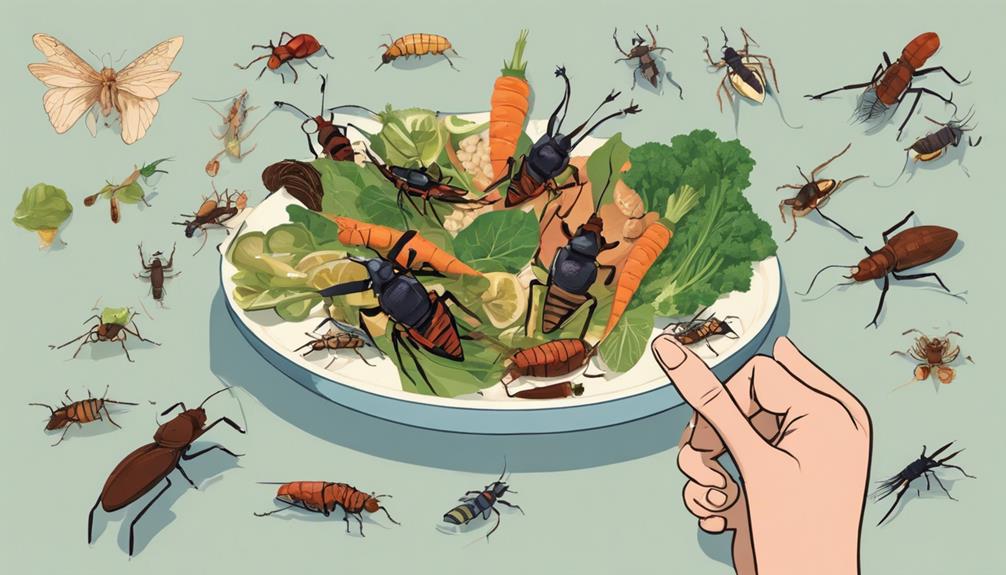
When providing a balanced diet for your pet scorpion, offer a variety of live insects such as crickets, mealworms, and cockroaches to guarantee the best nutrition. These insects are rich in essential nutrients like protein and vitamins that are crucial for your scorpion's health. Make sure to gut-load the feeder insects with nutritious foods such as fruits, vegetables, and commercial insect feed before offering them to your scorpion. This guarantees that your scorpion receives a well-rounded meal.
It's important to avoid feeding your scorpion wild-caught insects as they may carry harmful pesticides or parasites that could negatively impact your pet's well-being. Consider supplementing your scorpion's diet with occasional offerings of small spiders, lizards, or pinkie mice to introduce variety and additional nutrients.
Monitor your scorpion's feeding habits closely and adjust its diet as needed based on factors like its size, activity level, and overall health. By providing a diverse and balanced diet, you can help guarantee that your pet scorpion thrives in captivity.
Ensuring Scorpion Safety Measures
When handling scorpions, utilize long tweezers or gloves as protective gear to prevent potential stings.
Inspect the habitat regularly to confirm there are no escape routes or hazards present.
Familiarize yourself with safe handling techniques to minimize the risk of accidents and promote a secure environment for both you and your pet scorpion.
Safety Gear Essentials
To guarantee the safety of both yourself and the scorpion, utilize long tweezers or gloves for handling to prevent stings. When handling your pet scorpion, it's important to wear protective gear to avoid potential stings. Scorpions can see movement very well, so sudden gestures may startle them, leading to a defensive reaction.
Humidity plays a key role in maintaining scorpion health. Adequate humidity levels are essential for their well-being, as they require a certain level of moisture to thrive.
Ensuring your scorpion's enclosure is secure is important to prevent any accidental escapes, which could pose a risk to both the scorpion and yourself. Remember, safety gear and precautions are key when interacting with these fascinating creatures.
Habitat Inspection Tips
Inspect the scorpion's habitat thoroughly for any potential hazards or escape routes that could compromise the safety of both you and your pet. Check the enclosure for damages or openings that may allow the scorpion to escape. Look out for sharp objects or chemicals that could harm your pet.
Make sure the substrate isn't overly damp, as excess moisture can lead to mold growth and harm the scorpion. Monitor humidity levels closely, as they're vital for your scorpion's well-being. Regularly checking for signs of parasites or pests is essential to maintain a healthy environment.
Handling Techniques Overview
Promote scorpion safety during handling by utilizing long tweezers or gloves to minimize the risk of stings.
When interacting with your scorpion in its terrarium or aquarium, guarantee a calm environment to prevent defensive reactions. Avoid sudden movements or loud noises that may startle the scorpion, leading to potentially aggressive behavior.
It's essential to keep the enclosure secure to prevent escapes, ensuring the safety of both the scorpion and the handler.
If stung, especially by a species with venomous stings, seek immediate medical attention.
Respecting the scorpion's natural instincts and behaviors is key to maintaining a harmonious interaction, minimizing stress and potential aggression. Remember to handle your scorpion with care and attention to detail to foster a safe and enjoyable experience for both you and your pet.
Expert Advice on Scorpion Care
For ideal care of pet scorpions, maintaining a temperature range of 75-85°F (24-29°C) and a humidity level of 50-80% in their habitat is essential. Humidity plays an important role in scorpion care as it affects their respiratory function and overall well-being. Inadequate humidity levels can lead to dehydration and difficulties during molting processes. To guarantee proper humidity, mist the enclosure regularly while being cautious not to oversaturate the substrate, which could promote mold growth and harm the scorpion.
Aside from humidity, meeting the dietary needs of your pet scorpion is crucial. Feed them live insects like crickets or mealworms every 3-7 days to provide the essential nutrients they require. Additionally, always have a water dish available for drinking. Ensure the water level is shallow to prevent the scorpion from drowning and avoid flooding the substrate.
Helpful Tips for Scorpion Owners
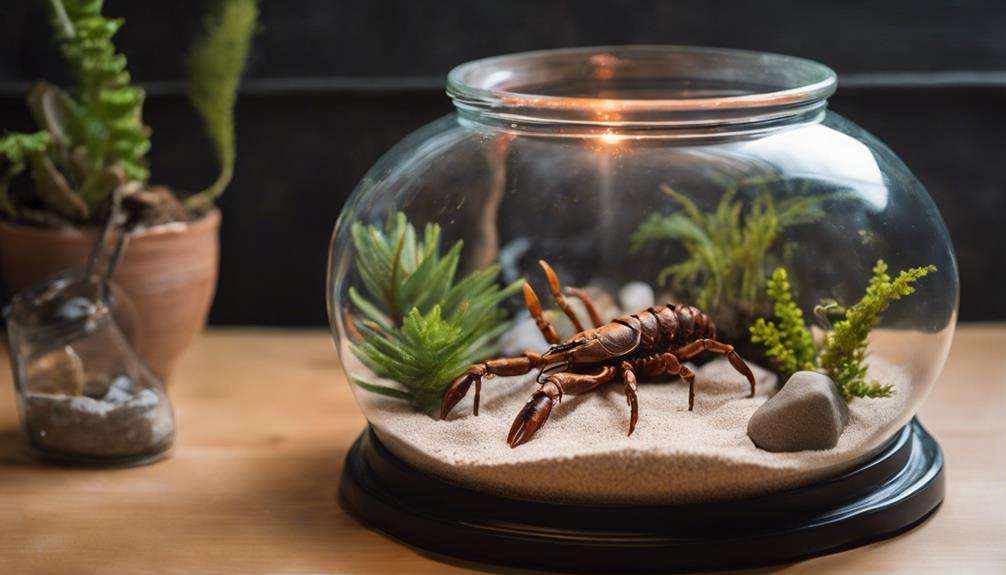
To enhance your experience as a scorpion owner, ensuring a secure enclosure is a fundamental aspect of maintaining a stress-free environment for your pet. Scorpions thrive in temperatures ranging from 75-85°F and humidity levels between 50-80%.
Proper humidity levels are critical for scorpions as they breathe through structures called book lungs, which require a certain level of moisture to function effectively. Inadequate humidity can lead to dehydration and respiratory issues in scorpions. To maintain the appropriate humidity levels, you can use a reptile fogger or mist the enclosure daily with water. Additionally, providing a shallow water dish can help regulate humidity levels within the enclosure.
Monitoring the humidity levels regularly is essential to ensure the well-being of your pet scorpion. By maintaining the recommended temperature and humidity levels, you can create a comfortable and healthy environment for your scorpion to thrive.
Background Information on Scorpions
Scorpions, belonging to the order Scorpiones, are arachnids characterized by their eight legs, pair of pincers, and venomous stinger at the end of their segmented body. These fascinating creatures are ectothermic, meaning they rely on external sources to regulate their body temperature.
Scorpions are most active when the temperature ranges from 70 to 90 degrees Fahrenheit, with desert species thriving in hotter climates and others preferring cooler environments. Extreme temperatures can be detrimental to scorpions, causing sluggishness or even death. To maintain best conditions for your pet scorpion, provide a habitat with a temperature gradient, including a warmer basking spot under a heat lamp or heating pad and cooler areas for retreat.
Monitoring the temperature within the enclosure is essential, as fluctuations can stress the scorpion. By understanding and managing temperature requirements, you can guarantee a comfortable and healthy environment for your scorpion companion.
Inspiring Stories From Scorpion Enthusiasts
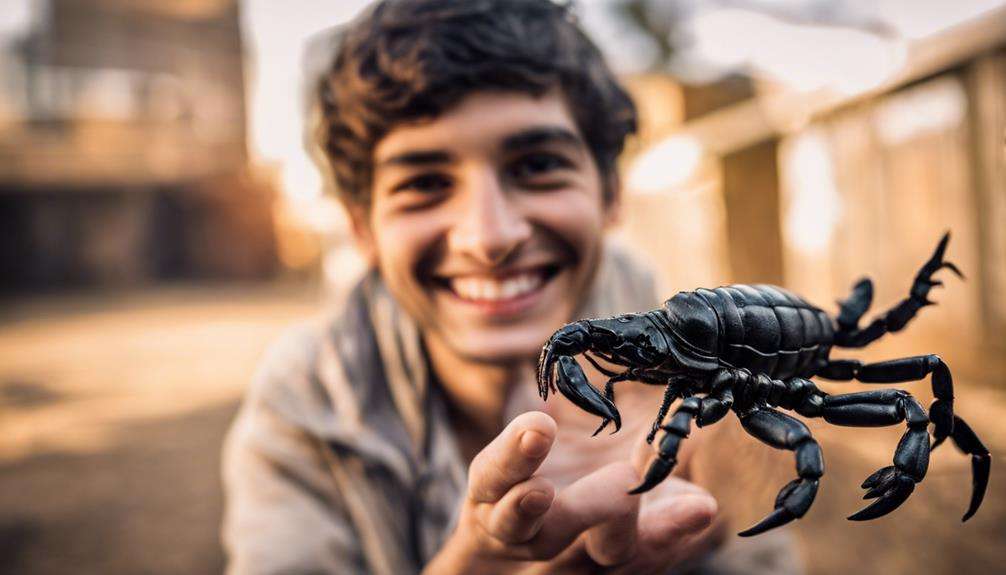
Engaging with passionate scorpion enthusiasts reveals a world of enthralling anecdotes and insights into the lives of these intriguing arachnids. Many enthusiasts share fascinating stories about their scorpions, detailing unique behaviors and interactions that highlight the complex nature of these creatures. Some enthusiasts meticulously document their scorpions' growth, observing changes in behavior and feeding habits to gain a deeper understanding and appreciation for their pets.
In addition to personal accounts, scorpion enthusiasts often discuss the importance of misting the enclosure to maintain proper humidity levels. Proper misting is essential for creating a suitable environment that mimics the scorpions' natural habitat, ensuring their well-being and promoting healthy molting cycles.
Through online forums and social media groups, enthusiasts connect with like-minded individuals, sharing experiences, insights, and advice on scorpion care. These interactions not only foster a sense of community but also contribute to the dissemination of knowledge about responsible scorpion ownership and conservation efforts.
Feedback on Your Scorpion Journey
Connecting with fellow scorpion enthusiasts through social media platforms can provide valuable feedback on your scorpion journey. By sharing your experiences online, you can receive advice, tips, and insights from experienced keepers. Joining online forums or groups dedicated to scorpion keeping will allow you to interact with a community passionate about these arachnids. Additionally, attending local reptile expos or events can provide you with the opportunity to meet fellow scorpion enthusiasts in person, enabling you to exchange experiences and knowledge directly.
Maintaining a detailed journal documenting your scorpion's growth, behavior, feeding habits, and environmental changes is important for personal reflection and improvement. This record won't only help you track your scorpion's progress but also serve as a valuable resource for seeking feedback from others. Seeking guidance from professional exotic pet veterinarians can offer tailored advice on your scorpion's care and well-being, complementing the feedback you receive from online sources and local enthusiasts. Don't forget to also consult your local pet store for insights and recommendations specific to your region's conditions.
Frequently Asked Questions
Can You Bond With a Pet Scorpion?
You cannot bond with a pet scorpion in the same way as traditional pets. Scorpion behavior is solitary; they do not seek companionship or show affection. It is essential to understand and respect their nature.
Are Scorpions Fun Pets?
Scorpion behavior is fascinating, making them fun to observe. Their unique hunting techniques and glow under UV light add intrigue. Minimal care needs suit busy lifestyles. Watching them feed can captivate. Maintaining scorpions is rewarding.
How Do You Raise a Pet Scorpion?
To care for a pet scorpion, provide a suitable enclosure, maintain proper temperature and humidity levels, feed live insects, and handle cautiously. Mimic their natural habitat with secure ventilation, rocks, and plants for a comfortable environment.
Can You Play With a Pet Scorpion?
You should not play with pet scorpions. Handling scorpions requires caution to prevent stings or injuries. Use long tweezers or gloves to interact safely. Observing their behavior and feeding them is ideal, as scorpions are not pets for play.
Conclusion
To sum up, guarantee your pet scorpion's habitat is meticulously maintained to promote their well-being and happiness.
By following the guidelines outlined in this guide, you can create a safe and enriching environment for your fascinating arachnid companion.
Remember, a carefully curated enclosure and attentive care will lead to a harmonious coexistence with your scorpion friend.
Happy scorpion keeping!
